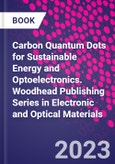Carbon Quantum Dots for Sustainable Energy and Optoelectronics reviews the synthesis, properties, and applications of carbon nanodots. This book provides readers with an overview of the key advances in the development of carbon quantum dots including synthesis and surface engineering strategies such as pyrolysis-based synthesis, biomass-based synthesis, functionalization, and other methods toward large-scale development of these carbon nanomaterials. The emerging applications of carbon quantum dots in different fields, such as energy harvesting, energy storage, and biomedical applications, are thoroughly reviewed, emphasizing the impact of enhanced properties of carbon quantum dots for these applications.
Carbon Quantum Dots for Sustainable Energy and Optoelectronics is suitable for graduate students, materials scientists, and engineers working in academia and industry. This book is also beneficial for the interdisciplinary community of researchers and practitioners working in the field of nanotechnology.
Please Note: This is an On Demand product, delivery may take up to 11 working days after payment has been received.
Table of Contents
1 Photophysical properties of carbon quantum dots
2 The physical and chemical properties of carbon dots via computational modeling
3 Synthesis of carbon quantum dots
4 Characterization and physical properties of carbon quantum dots
5 Surface engineering of carbon quantum dots
6 Photodetector applications of carbon and graphene quantum dots
7 Photovoltaic application of carbon quantum dots
8 Light-emitting diode application of carbon quantum dots
9 Nanoelectronic applications of carbon quantum dots
10 Carbon quantum dot-based nanosensors
11 Carbon dots: biomedical applications
12 Bioimaging applications of carbon quantum dots
13 Photocatalytic applications of carbon quantum dots for wastewater treatment
14 Current prospects of carbon-based nanodots in photocatalytic CO2 conversion
15 Carbon quantum dots and its composites for electrochemical energy storage applications
16 Magnetic and nanophotonics applications of carbon quantum dots
17 Carbon quantum dots: An overview and potential applications in terahertz domain
18 Nanocarbon-based single-electron transistors as electrometer
19 Nanodiamonds for advanced photonic and biomedical applications
20 Future perspectives of carbon quantum dots
Authors
Sudip Kumar Batabyal Associate professor in the Department of Science and Senior Research scientist in ACIRI, Amrita School of Engineering, Amrita Vishwa Vidyapeetham, India. Dr. Sudip Kumar Batabyal is an associate professor in the Department of Science and seniorresearch scientist in the ACIRI, Amrita School of Engineering, Amrita Vishwa Vidyapeetham,
Coimbatore, Tamil Nadu, India. Basudev Pradhan Assistant Professor at the Department of Energy Engineering, and Centre of Excellence (CoE) in Green and Efficient Energy Technology (GEET) at the Central University of Jharkhand, Ranchi, Jharkhand, India. Dr. Basudev Pradhan is an assistant professor at the Department of Energy Engineering, Centre of Excellence (CoE) in Green and Efficient Energy Technology (GEET), Central University of Jharkhand, Ranchi, Jharkhand, India. Kallol Mohanta Assistan Professor, PSG Institute of Advanced Studies at Coimbatore, India. Dr. Kallol Mohanta is an assistant professor at the PSG Institute of Advanced Studies, Coimbatore, Tamil Nadu, India. Rama Ranjan Bhattacharjee Associate Professor and Head, Amity Institute of Nanotechnology, Amity University in Kolkata, India. Dr. Rama Ranjan Bhattacharjee is an associate professor and head of the department at the Amity Institute of Nanotechnology and also a university research coordinator in Kolkata, West Bengal, India. Amit Banerjee Assistant professor and group leader, Microsystem Design-Integration Lab, Physics Department, Bidhan Chandra College, Asansol, West Bengal, India.. Dr. Amit Banerjee is an assistant professor and group leader at the Microsystem Design-Integration Lab, Physics Department, Bidhan Chandra College, Asansol, West Bengal, India.








